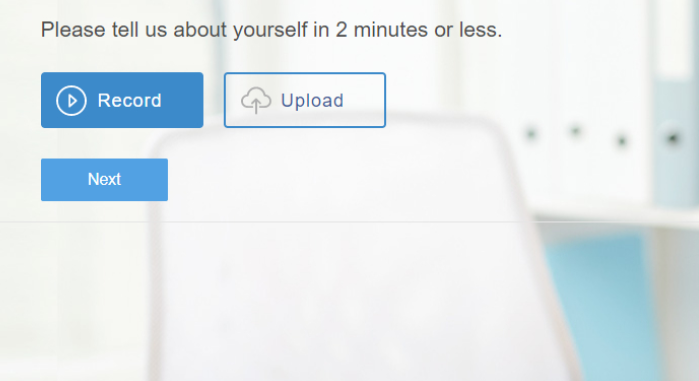Interviewing a candidate for a job role is not just asking a series of questions. It’s really a lot more than that.
Add to that a situation like a pandemic where organizations all across the globe were operating from homes, and your task of hiring becomes even more complex since you are doing it remotely.
A Gartner HR survey found that 86% of organizations conducted virtual interviews to hire candidates during the coronavirus pandemic. Not only do recruiters prefer video interviewing, but as many as 57% of candidates do too.
And now, pandemic or no pandemic, remote hiring is the new normal.
While remote hiring allows companies to adapt to unforeseen changes, it still poses several challenges for the recruiters, including coming up with the right questions and choosing the right software to conduct such an interview.
But the good news is that they can create an online skill assessment test or a personality assessment using video interview questions.
| What Are Video Interview Questions?It’s a type of interview question that candidates can respond to by recording a video or uploading an existing video.
In simple words, a video interview question gives the recruiter a front-row seat to a candidate’s personality since there are no ‘yes’ or ‘no’ type responses. The candidates can freely present their responses, concerns, or opinions via video and show their potential. |
|---|
However, picking the right questions to ask in a video interview can be a bit tedious.
To help hiring managers, we’ve compiled a list of video interview questions that can help you have a collaborative and communicative conversation during online interviews.
But before that, we’d like to throw some light on a few points that’d help recruiters prepare for conducting video interviews.
How to Conduct Video Interviews – Tips for Hiring Managers
Recruiters and hiring managers should devote considerable time to prepare for the interview as it is one of the best ways to maximize your chances of hiring the best candidates.
They must have a clear sense of what they’re looking for, with whom they’re speaking, what they’re going to ask, and how they will allocate the time.
Here are some tips that will help recruiters prepare for the video interview:
-
Choose a Good Online Assessment Software
Watch: How to Choose the Best Assessment Software
Choosing a good online assessment software is just as important as choosing the right candidate. With so many video interviewing solutions, the decision to choose the best may appear a little foggy. But, you must choose software that can help make the whole hiring process easier, quicker, and more convenient for you and the candidates alike.
Be wise while making the decision, as choosing the wrong software can lead to a bad hire. If you don’t want to spend too much time looking for one, here’s a list of the 10 Best Online Assessment tools that you can choose from.
-
Add Video Interview Questions to a Skill Assessment Test.
Watch: How to Create a Video Interview Question
The two-fold benefit of adding your video interview questions to a skill assessment test is you get to learn about the candidates as well as assess their skills and knowledge required for the role that you’re hiring for.
Conducting video interviews is not fruitful if your candidates do not have the required skills for a particular role. It is simply a waste of time. So, you must conduct an online skill assessment test with video interview questions for further assessment.
For instance, with ProProfs online assessment software, you can create an online skill assessment test and use the “record video interview questions“ to accept video responses from your candidates.
You may create a new assessment test or choose from a collection of 100+ ready-to-use skill assessments.
Skill tests enabled with video responses can give you a 360-degree view of a candidate’s ability.
-
Prepare a List of Instructions for Candidates.
Your candidate may have never faced a video interview before. Whether that’s the case or not, you must prepare a list of instructions for your candidates that’s mailed to them beforehand to ensure a smooth assessment process.
For this, you must first test and record the responses yourself to see if there’s any kind of functionality that your candidates must be familiar with beforehand.
For instance, if you’re going to conduct a skill or psychometric assessment test integrated with video interview questions, you must guide the candidate to finish the assessment first and then take up the video interview questions.
Here are some instructions that can help you prepare your candidates for the video interview:
- Recommending minimum internet connection speed required for the process
- Telling the candidate to be properly audible and visible in the video
- Letting them know who will be assessing their responses
- Being transparent about the time-limits
Send candidates an email with detailed yet simple instructions, make sure that the candidates know what’s expected of them, and reach out if they need some sort of assistance.
-
Take Measures to Keep Cheating at Bay
One of the disadvantages that come along with one-way video interviews is that the candidates are free to reassess their answers. While that is not necessarily cheating, it does affect the way recruiters assess candidates’ promptness.
Here’s what all you can do to keep cheating at bay:
- Vary questions in each assessment
- Set a time limit on each question
- Restrict the number of attempts for responding to a question
-
Sample Video Interview Questions
Plan the questions that you are going to ask the candidates. Draft, refine, and line up the essential questions. Decide how much time you wish to allow the candidates to answer.
If you need further clarification on something mentioned in their resume, think of how you can do that through the video interview questions. Draft questions that will drive insight on the candidate and assess their ability to excel in the job role.
Interesting Read: 5 Best iSpring Alternatives
Now, let’s look at the most common video interview questions.
15 Best Video Interview Questions
These video interview questions will help recruiters make the most informed decision and learn if the candidates are a cultural fit for their company.
To keep it simple, we’ve segregated the questions under different categories, as follows:
- General video interview questions
- Behavioral video interview questions
- Career Development video interview questions
- Situational video interview questions
Let’s take a look at all of them and also understand how asking such questions can help you assess candidates better:
General
- Tell me something about yourself.
Candidates put the best summary about themselves on the resume, but that’s not enough information for you to hire them. There’s a lot that you should know about the candidate, especially the information which can not be found on their resume or a LinkedIn profile. Also, considering that over 80% of job applicants lie on their resume, this question can really give some insights.
The answer to this question will help you understand a candidate’s personality, how they present themselves, their communication style, and more.
However, there is always a chance of candidates giving you a scripted answer, and well, that’s kind of obvious that they’d have prepared one.
But, when conducting a video interview, you can just give the candidate the record a video response instead of uploading a prerecorded video. Doing so can help the case to a great extent.
Related Read: How to Create a LinkedIn Quiz
- Why do you want to work here?
Even though information about any company is easily accessible through the internet, not every candidate would do their homework. Some of the candidates may not even know what type of business your company runs, while some may have well-researched facts and figures.
Asking this question will help you determine who is sincerely interested in working for and who isn’t. And, while they’re answering, you’ll have to watch how well they’re drawing parallels between your company and their aspirations.
- What are your greatest strengths and weaknesses?
Asking candidates about their strengths and weaknesses can help you learn a lot about their personalities. How quickly they’re able to tell you their strengths and weaknesses without giving it a lot of thought will help you identify their level of self-awareness and consciousness.
Assessing their weaknesses will help you find out if their profile will conflict with the job requirements, whereas assessing the strengths will help identify how well they will align with the job role.
- Why are you leaving your current place of work?
You should ask this question to see how the candidates present their current employer. Pay close attention to how they describe their current place of work, see if they assert more on the negative aspects of their job, or talk about things that made them unhappy in their current role.
The answer to this question will help you assess their civic sense and professionalism. Also, you can compare the attributes of their previous place of work to your company’s to see if it provides an alternative to the factors to the candidate dropping out of their current job role.
- What interests you about this position? What skill or experience makes you a good candidate for this position?
Asking this question will help you find out if the candidate applied to the job opening blindly or they considered themselves the right fit for the job role. You can learn if they carefully read the job description before applying for the job opening.
You can assess if the candidates are well-versed with the specifics of the job role based on how they answer this. The candidates should be able to give a critical explanation of their abilities that will benefit your company and share why they feel they would be a good fit.
A well-crafted answer will touch on skills the candidate has as well as highlight the skills they wish to develop or improve.
- Where do you see yourself in five years?
As clichéd as it may sound, asking about a candidate’s future goals will help you select candidates who are professionally driven and have lofty career aspirations.
Hiring career-oriented candidates who clearly see opportunities within your company is practical since they are more likely to be happy in the long run. Select candidates whose career goals align with your company’s values, mission, and/or goals.
The answer to this question will also help you figure out how long the candidate plans on working in your company. If their long-term career goals can not be accomplished by working at your company, then they may not be the best fit.
By asking the candidate to describe their long-term career goals, you can assess how ambitious, goal-oriented, and hardworking they are.
Behavioral
- What has been your greatest achievement, and how?
A great way to assess how the candidates measure or define success is by asking them about their greatest achievements. When you ask this question, it will give the candidates a chance to use real-life examples from their work experiences to show how they put their skills up to the best use.
It is one of the best ways to find out how well they’ve made the most of their learning and knowledge.
- Did you ever have a work overload? If yes, how did you manage it?
If you want to assess your candidates’ organizational and time-management skills, this is one of the best questions to ask. This question will allow the candidates to showcase how they prioritize a long list of tasks, adapt to new challenges, or work under pressure.
Assess whether they can keep up with constraints at work and keep up with the pace of the work at your company.
- Describe your experience of working with someone whose style and personality were different from yours.
When hiring for a role that requires the candidates to have good collaboration skills and a spirit of cooperation, this could be the best question to ask. Making the candidates draw instances where they worked with a different style of working can tell a lot about their conflict-resolution skills and the ability to find common ground to nail the job assigned.
Pay attention to the tone they use when describing their experience of working with other people. You’ll get to know if the candidate is good at solitary work or whether they can thrive in a team or group environment.
- What is a development area that you had to overcome to improve in your career?
Over the period of one’s tenure, one comes to realize areas of development through self-assessment. These areas would include how they manage their tasks, the quality of their work, ways to deal with challenging circumstances, etc.
Asking this question would help you assess how self-aware they are or if they’ll go through the process of self-assessment to give the best output.
- How do you wish to improve yourself in the next year?
After you’ve asked the candidates about their potential areas of improvement, you can ask about how they plan to improve themselves in the following year. The answer to this question will set before you their goals for professional development, which may include strengthening a weakness, building upon a strength, or developing a new skill that can help them in their career.
It will also tell you if they’re really keen on working on the areas of improvement identified by themselves. Above all, it will give you an insight into the candidate’s willingness to invest in their own growth.
Career-Development
- What career accomplishments are you most proud of?
While it’s important to hire someone who has the most desirable set of skills, you’d also want to hire someone who takes pride in their job role. When you ask this question, it gives the candidates a chance to shed light on some of the best highlights of their careers.
Not only will it make the candidates comfortable and at ease, but it will also help you assess the kind of work that delights them and see if it sits parallel to the job role you’re offering. Also, if a candidate refuses to share some highlights, it’s a red flag right there!
Situational
- Tell me about a difficult situation at work and how you dealt with it.
Almost everyone in their career faces a challenging situation. It is the account of how they dealt with the situation that can help you get a sense of their critical thinking skills as well as analytical skills.
Asking this question will allow the candidates to describe their experience of working in challenging circumstances. They can also give an account of how well they put their problem-solving skills to use to deal with the challenges.
- Describe your ideal work environment.
With this video interview question, you can let the candidates describe what kind of work environment they’d be delighted to work in, so you can assess if they’d be a good fit for your company. This question can also help you assess how productive the candidate can be when exposed to a changing work environment.
- Do you have any questions for me?
This is a good question to wrap up the interview. A lot of times, candidates also have questions for the interviewers about the job that they’ve applied for.
However, you can not get back to their questions in an online interview. But, you can reach them by email and add your response.
So, those were the most common and popular video interview questions that you can ask in an online video interview. You can ask these questions when hiring for any profile in any company.
However, if you’re looking for a specific set of profile-based questions, hop on to the next section.
Profile-Based Video Interview Questions
When hiring for profiles like sales, customer service, or others, you have to prepare a specific set of questions that would push you closer to hiring the most qualified and skilled candidates.
Here we’ve provided some of the most relevant profile-based video interview questions that you can use while hiring for different job roles.
Customer Service Interview
- Please tell us about yourself in 2 minutes or less.
- How would you handle an angry customer?
- What do you know about our company?
- What does good customer service mean to you?
- What makes you interested in customer support?
- How do you deal with a difficult customer?
- Tell us about a time when you turned an unhappy customer into a happy one.
- Can you describe a time when you had to say no to an important customer request?
- Please describe which customer support tools you have experience using and your degree of proficiency.
Sales Interview
- Please tell us about yourself in 2 minutes or less.
- What is the last thing you sold and why should I buy it?
- What makes you interested in this position?
- Tell us what you know about our company.
- What is your best memory of a sale you won?
- Tell us about a sale you lost.
- What do you like the most about your current role?
- What type of work environment do you do your best work in?
- Have you ever had a manager you didn’t like? Why?
- Why does the sales profile interest you?
- How do you handle rejection or objections from a prospect?
- How do you handle disappointment?
Technical Interview
- Please tell us about yourself in 2 minutes or less.
- What makes you interested in this position?
- What is the greatest challenge you have overcome at work?
- What do you like the most about working in technology?
- Who is your role model in the technology world and why?
- What technical skills make you a good candidate for this position?
- What’s your favorite programming language, and why?
- What technology are you most proficient in?
- What do you do to stay up-to-date on your technical knowledge?
- How would you overcome the challenge of working with a difficult co-worker?
Administration Interview
- Please tell us about yourself in 2 minutes or less.
- What does a job well done mean to you?
- What has been your proudest moment?
- What do you know about our company?
- What would you like to achieve in this role?
- How do you manage stressful situations?
- What tools do you use to stay organized?
- Have there been times when you have gone above and beyond?
- What are your greatest professional strengths?
- What have you learned from your mistakes?
Well, that was a quick round-up of some of the best questions you can ask your candidates during an interview. And, considering the recent shift in hiring patterns, these video interview questions can be handy for your next round of hiring.
In the next section, you’ll learn how you can create a video interview.

How to Create Video Interview Questions
Creating video interview questions is as easy as creating any other question type. Using the record video question type in assessment software, you can develop an assessment with video interview questions in a few simple steps:
- Step 1: Choose the record video question type from the list of question types
- Step 2: Add the question and add a description to explain any additional details or instructions
- Step 3: Choose the number of retakes allowed
- Step 4: Choose whether the quiz taker can record or upload a video answer or do both
- Step 5: Select recording time
- Step 6: Click on preview to check how it looks or click on Save

Here’s how a video interview question looks like:
The degree of remotely interviewing a candidate extends well beyond assessing their skills and abilities, industry expertise, personality, identifying strengths and weaknesses, and more.
And, video interview questions (as listed above) help you touch down all those aspects.
You can easily assess your candidates and narrow down the interviewing funnel better than in-person meetings. What’s more, this even maximizes your chances of hiring the best candidates for any role from anywhere in the world quite efficiently.
What’s not to like?
Also, you can create online assessments from scratch, or to make things easier, choose from a collection of 100+ professionally designed ready-to-use assessments offered in ProProfs online assessment software’s assessment library.

 We'd love your feedback!
We'd love your feedback! Thanks for your feedback!
Thanks for your feedback!







